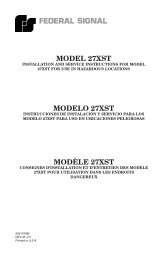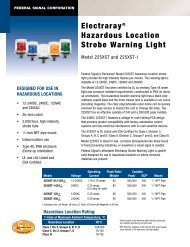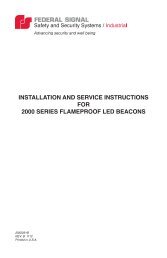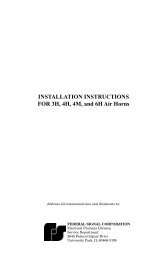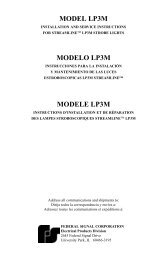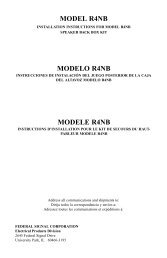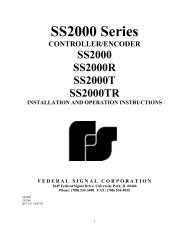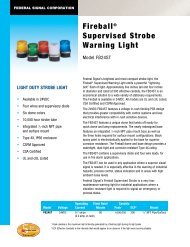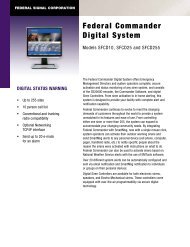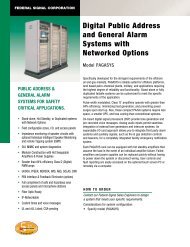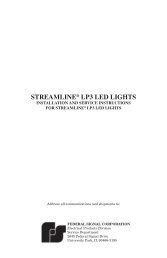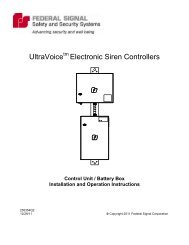SFCD: Federal Commander Digital System - Federal Signal
SFCD: Federal Commander Digital System - Federal Signal
SFCD: Federal Commander Digital System - Federal Signal
Create successful ePaper yourself
Turn your PDF publications into a flip-book with our unique Google optimized e-Paper software.
<strong>Federal</strong> <strong>Commander</strong> <strong>Digital</strong> <strong>System</strong><br />
The <strong>System</strong> Log frame allows the ability to map system log messages to a group of<br />
users. When the selected event occurs, a SmartMsg will be sent to the group of users<br />
selected. Up to ten user groups may be configured.<br />
Note: Use caution when selecting messages that may have a high incidence of<br />
occurrence.<br />
Message Filter<br />
Use the message filter to select which system log messages will be sent to the respective<br />
SmartMsg group.<br />
Resend alarm notifications each time alarm condition is reported<br />
Select this option if it is desired to SmartMsg RTU alarms each time an alarm condition is<br />
reported. RTU alarms are reported each polling cycle.<br />
Do not repeat notification for existing alarms<br />
Select this option to SmartMsg only new alarms. This will prevent notification of the same alarm<br />
each time the system is polled.<br />
<strong>System</strong> Fail<br />
Introduction<br />
<strong>System</strong> Fail is a user configurable status point. The user determines the conditions which<br />
constitute a <strong>System</strong> Fail using the <strong>System</strong> Fail Setup dialog, available from the Status Base<br />
screen.<br />
<strong>System</strong> fail is comprised of two components:<br />
Individual <strong>System</strong> Fail.<br />
General <strong>System</strong> Fail.<br />
Individual <strong>System</strong> Fail is reported on the Status Detail screen for each site in the system. This<br />
status point is set to fail when the conditions setup on the Alarm Filter is met following reception<br />
of a poll response. An individual system fail does not cause an entry in the system log or start a<br />
callout or email process.<br />
A general <strong>System</strong> Fail occurs when the number of individual sites with <strong>System</strong> Fail exceeds the<br />
number setup in the “Number of failed sites constitutes <strong>System</strong> Fail” parameter. At this time, a<br />
“<strong>System</strong> Fail” entry will be posted to the <strong>System</strong> Log and if enabled, callout and email will occur.<br />
Callout and Email use the same callout list and email parameters as other alarms (standard<br />
software).<br />
The system checks for a general system fail once a minute by scanning individual sites. Once a<br />
general system fail occurs, all individual system fails are cleared. A general system failure will<br />
occur the next time the number of failed individual sites equals or exceeds the configured value.<br />
This will normally occur following the next system polling.<br />
<strong>System</strong> fail setup dialog<br />
Clicking on the <strong>System</strong> Fail button displays the <strong>System</strong> Fail setup dialog:<br />
124<br />
<strong>System</strong> Setup



